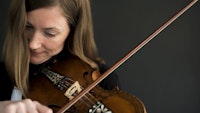Today’s performer is fundamentally different from their counterpart a century ago. Particularly since the recording business emerged, the demands for technical perfection have, to an increasing degree, been a constraint upon the performer’s free exercising of his or her creative impulse. In our opinion, this leads to an expectation of ‘error-free’ conformity that suits the role of classical music in today’s society, where it is seen more and more as elitist, set in its ways, and out of touch.
"Some kind of deep insight into the driving forces behind the music..."
However, the situation doesn’t need to be like this. The classical heritage is as challenging and exciting as ever. Many musicians look under the well-known surface, searching for the deeper forces of the works they perform. The ‘Reflective Musician’ project is about the different types of knowledge that are necessary to access these forces. These may be conscious or intuitive, but we are convinced that some kind of deep insight into the driving forces behind the music is necessary to ensure that the interpretation casts off conformity and emerges as personal and genuine.
Intuitive Interpretation
One may say that not everyone needs this knowledge. Some artists seem to possess the talent to get to the essence anyway. This may be right, but the question is then whether they are genuinely making do without the knowledge or simply using the kind of intuitive knowledge talked about above. They may be ‘knowing without knowing that they know’ – a little like when Stravinsky said about Boulez’ analysis of Le Sacre: “Very interesting! I never thought of it!”
Contact with the Living Composer
When speaking of music written in our own time, things are a bit different. Apart from the fact that it still takes courage to defy the stereotypes of mainstream repertoire and engage in contemporary works (although, fortunately, this defiance is becoming more common among younger performers), the contact between the performer and the living composer is necessarily different from that with a composer long-deceased.
Although the objective would always be to penetrate to the core of the work, the danger of conformity is not such an issue with new and unknown material. The role of the performer of new compositions may also be quite different from a classical, re-creative one.
Co-Creation as Interpretation
Whilst allowing for these differences, in both cases the process of interpretation will ideally be a sort of co-creation, as it were, with the composer, in which the performer ‘composes’ the work anew from inside the act of performance, striving to create something that is simultaneously unique and as faithful as possible to the composer’s original conception.
Performance Cognition Methodology
The next question is: Which kinds of performance knowledge will lead to a specific, unique interpretation?
Attempting to answer this question, we will use mainly analytical methods that investigate and reveal the constituting forces of the creative process, not just looking at the surface of interpretations. One approach is Schenkerian analysis, enhanced with Schönberg and Caplin’s formal function approach.
We will also make use of the auditive-sonological approach (emergent forms) that takes as its point of departure the sounding work rather than the written one. The two different approaches will hopefully lead to fruitful confrontations and discussions. Also, the analytical thinking of Messiaen, that had such an impact on a whole generation of composers, will provide a range of useful tools when dealing with certain styles.
Identifying with the Composer
An important aspect of the project work will be to spot elements in the composer’s personality, psyche, etc. that the performer can identify with. This may be particularly difficult when it comes to composers who lived centuries ago. The performer’s task is to expand the area of common ground, without pretending to achieve a total merging of sensibility with that of the composer, for which he or she would have to ‘become’ the composer.
Whatever period the work was written, it is important that one can ‘peel off’ the layers of standardisation, and any approach transmitted by so-called tradition. By doing this, the work may (re-)emerge as new in our time.
Performance and Analysis
Traditional musicology has commonly used analytical methods to examine the inner structure of musical works, but generally, the discipline has shied away from linking this explicitly to how performers might make choices as part of developing their interpretations of these works.
In such a view, interpretation begins where science stops. Even more recent, performance-focused Musicology tends to regard the performer as a subject for scientific observation, not as a co-investigator.
Performing is, in our view, not some kind of undefinable, occult exercise, nor is it simply a set of behavioural patterns to be externally codified. Rather, it is an inherently creative activity based on its own systems of knowledge which, whether conscious or intuitive, ought to be capable of being articulated in words as well as in practical music-making.
If we manage to make young musicians aware of this, we may be able to break down some of the barriers that currently inhibit them from finding their “own” voices and make musical life so predictable.
Publications and results
Håkon Austbøs artikkel om tre pianoverker av Brahms, Boulez og Beethoven:
- Can musical thinking enhance performance?
- Videos: Discussions and Performances
- Project Events
Funding
The project is funded by The Norwegian Artistic Research Programme (diku.no).

